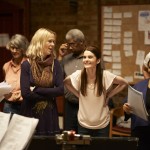Adapted by Michael Petroni (The Rite, The Chronicles of Narnia: Voyage of the Dawn Trader) from Markus Zusak’s Best Selling novel of the same name, The Book Thief is an English language tear-jerker set in a German village during World War II that is too worthy for its own good.
Downton Abbey Director Brian Percival directs with the phlegmatic pacing of a television series, and we are continually reminded that we are watching actors delivering meaningful lines on the set of Studio Babelsberg. Even Roger Allam’s Grim Reaper narration fails to create any tension.
Thirteen-year-old Liesel (Sophie Nelisse) has been displaced, along with her Communist mother and her younger brother, by Hitler’s anti-Communist purge. After Liesel’s brother dies, she is delivered in a black car to foster parents, although it does not appear to be an underground network that arranged this. Rosa Hubermann (Emily Watson), the insensitive, unwelcoming foster mother, criticises Liesel’s absent mother for having dragged starving and unwashed children across the country.
What Rosa lacks in warmth and charm, her husband Hans (Geoffrey Rush) more than makes up for, winning over the traumatised girl in no time. When Liesel is bullied at school for illiteracy, Hans sets up a reading class in the basement of the house. This will soon become a refuge for the intellectual bookworm Max (Ben Schnetzer) the son of a Jewish man who saved Han’s life in WWI. In contrast to our book worshipping group, the townsfolk are burning books in 1938’s Kristelnach. Liesel, who attends, salvages a book.
If Hans has taught Liesel to read, Max encourages Liesel to write. He gives her a diary because ‘words are life.’ Quoting Aristotle, he also tells her that ‘memory is the scribe of the soul.’ Readers will not be surprised to learn that she will eventually turn her memories into best sellers. But first, in the air-raid shelters, Liesel entertains the townsfolk with her first stories.
Hans is already under suspicion and is denied work for refusing to join the Nazi party, so feeding four people is a challenge. Rosa ekes out a living doing laundry for the wealthy Buergmeister (Rainer Bock). For Liesel, this is fortunate, for she discover the Buergmeister’s library. Luckily, too, the lonely Frau Buergmeister (Barbara Auer) who has turned the library into a memorial for their dead son, allows Liesel to read books with her.
The Buergmeister resents Liesel’s presence in the library. He fires Rosa leaving Liesel to ‘borrow’ a book (symbolically, H.G. Wells’ The Invisible Man) to read to Max when he becomes deathly ill. Liesel’s adorable school friend and neighbour Rudy (Nico Liersch) who has a crush on Liesel, discovers her clandestine activity, nicknaming her the Book Thief.
Given the novel’s length, we expect a lot to be omitted, but nothing prepares us for Rosa’s sudden change from shrew of the year to loving mother and wife and, although a German Christian, altruistic saviour of a Communist orphan and a Jew. In one scene Rosa assumes the role of the shrew in front of Liesel’s school class, and the viewer has to wonder why. Are the Nazis more likely to turn a blind eye to foster mothers who deride their husbands as well as their wards?
Having watched many authentic films about this period we almost expect the Germans to speak to one another in German even if it is no more than occasionally, as in Cabaret. In any event, it does not help a fictitious story to have famous British and Australian actors (Nélisse is bilingual French/English) playing Germans but speaking English with not-entirely-convincing German accents.
Nor does it help that the characters are divided between saints and sinners as in a morality play. We could accept all that, however, if not for the overly contrived and sentimental nature of the story that will prevent many viewers from forgetting they are watching a well-intentioned film.




